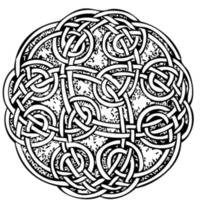Interlace
Title
Interlace
Description
According to artist George Bain, Religion and Pagan laws had the greatest influence on the art form of Celtic knots, playing an important role in there design.
The interlacing of human form and Celtic knots evolved from laws forbidding drawing portraits of human figures as this was tantamount to copying a work of the creator, “God the Almighty,” explains Bain in his book Celtic Art. Similarly, it was forbidden to draw animals or plants. Angels and mythic creatures, on the other hand, were not of the earthly realm. And Saints had departed this realm. Thus, Celtic knot patterns were used to represent most of the human form, while heads, appendages and tails were often depicted using more life-like representations.
The interlacing of human form and Celtic knots evolved from laws forbidding drawing portraits of human figures as this was tantamount to copying a work of the creator, “God the Almighty,” explains Bain in his book Celtic Art. Similarly, it was forbidden to draw animals or plants. Angels and mythic creatures, on the other hand, were not of the earthly realm. And Saints had departed this realm. Thus, Celtic knot patterns were used to represent most of the human form, while heads, appendages and tails were often depicted using more life-like representations.
Creator
Vector image created from George Bain book, Celtic Art.
Citation
Vector image created from George Bain book, Celtic Art., “Interlace,” Open Virtual Worlds, accessed February 10, 2026, https://openvirtualworlds.org/omeka/items/show/394.
Embed
Copy the code below into your web page
